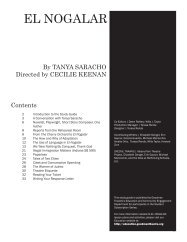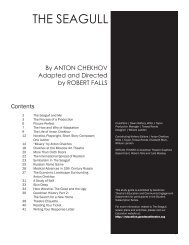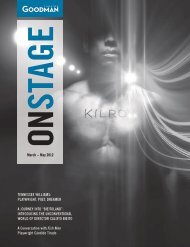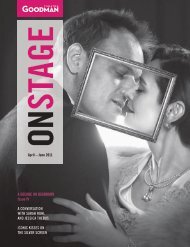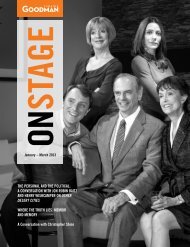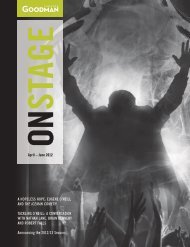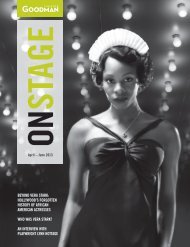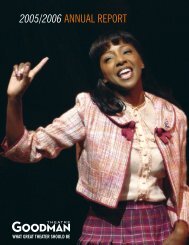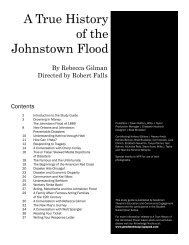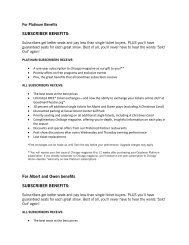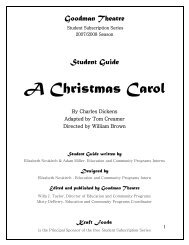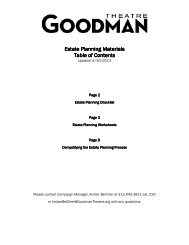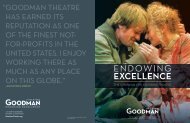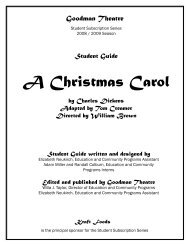Onstage Magazine Download OnStage ... - Goodman Theatre
Onstage Magazine Download OnStage ... - Goodman Theatre
Onstage Magazine Download OnStage ... - Goodman Theatre
You also want an ePaper? Increase the reach of your titles
YUMPU automatically turns print PDFs into web optimized ePapers that Google loves.
June – August 2013<br />
The Jungle Sings and Sways:<br />
Music and Dance in The<br />
Jungle Book<br />
The Sights and Sounds<br />
of India: Reimagining The<br />
Jungle Book<br />
Albany Park Theater Project<br />
Presents the Latino <strong>Theatre</strong><br />
Festival Finale
June – August 2013<br />
CONTENTS<br />
In the Albert<br />
2 The Jungle Sings and Sways: Music and Dance in The Jungle Book<br />
6 The Sights and Sounds of India: Reimagining The Jungle Book<br />
8 The Laureate of the Jungle: Rudyard Kipling<br />
At the <strong>Goodman</strong><br />
9 Insider Access Series<br />
In the Owen<br />
10 Albany Park Theater Project Presents the Latino <strong>Theatre</strong> Festival Finale<br />
In the Wings<br />
12 STEM to STEAM: Integrating the Arts into Science Learning<br />
At the <strong>Goodman</strong><br />
13 The 2012/2013 Playwrights Unit<br />
Off Stage<br />
14 The <strong>Goodman</strong> <strong>Theatre</strong> Gala is a Great Success!<br />
By the Way, Meet Vera Stark Opening Celebration<br />
15 The Happiest Song Plays Last Opening Celebration<br />
The 9th Annual Estate Planning Seminar<br />
16 Women’s Night 2013, Featuring By the Way, Meet Vera Stark<br />
Business Council Spring Reception<br />
For Subscribers<br />
17 Calendar<br />
Volume 29 #5<br />
Co-Editors | Lesley Gibson, Lori Kleinerman,<br />
Tanya Palmer<br />
Graphic Designer | Amanda Good<br />
Production Manager | Lesley Gibson<br />
Contributing Writers/Editors | Nazihah<br />
Adil Siddiqui, Neena Arndt, Jeff Ciaramita,<br />
Lisa Feingold, Katie Frient, Lesley Gibson,<br />
Lori Kleinerman, Dorlisa Martin, Julie<br />
Massey, Tanya Palmer, Teresa Rende, Victoria<br />
Rodriguez, Denise Schneider, Steve Scott,<br />
Willa J. Taylor, Kate Welham.<br />
<strong>OnStage</strong> is published in conjunction with<br />
<strong>Goodman</strong> <strong>Theatre</strong> productions. It is<br />
designed to serve as an information source<br />
for <strong>Goodman</strong> <strong>Theatre</strong> Subscribers. For ticket<br />
and subscription information call<br />
312.443.3810. Cover: Image design and<br />
direction by Kelly Rickert.<br />
<strong>Goodman</strong> productions are made possible<br />
in part by the National Endowment for<br />
the Arts; the Illinois Arts Council, a state<br />
agency; and a CityArts grant from the City<br />
of Chicago Department of Cultural Affairs<br />
and Special Events.<br />
Written comments and<br />
inquiries should be sent to:<br />
The Editor, <strong>OnStage</strong><br />
<strong>Goodman</strong> <strong>Theatre</strong><br />
170 North Dearborn Street<br />
Chicago, IL 60601<br />
or email us at:<br />
<strong>OnStage</strong>@<strong>Goodman</strong><strong>Theatre</strong>.org
IN THE ALBERT<br />
From the Artistic Director<br />
Photo by Dean LaPrairie.<br />
Why The Jungle Book?<br />
Few works of literature have become as lodged in popular culture as The Jungle Book. First published in<br />
1894, Rudyard Kipling’s tales of the “man-cub” Mowgli and his adventures among the animals in the wilds<br />
of India have captivated generations of readers young and old, and, perhaps not surprisingly, have spawned a<br />
variety of critical responses as well. Some have seen the stories as thinly disguised metaphors expressing<br />
Kipling’s own dissatisfaction with the excesses of British imperialism; others view them as a celebration of<br />
British supremacy. A number of analysts have embraced the stories as timeless parables of innocence and its<br />
power over oppression and cynicism; others have seen them as remnants of a social system long since discarded.<br />
But no one has denied the power of Kipling’s poetry and imagination, the sheer beauty and mystery<br />
of its jungle setting and the delightfully anthropomorphic beings that he created: the wisely noble panther<br />
Bagheera, the slyly seductive snake Kaa, the terrifying tiger Shere Khan or Mowgli’s gregarious mentor, Baloo<br />
the bear. Kipling’s tales have been adapted into dozens of different versions in different media, from comic<br />
books and children’s plays to a variety of film versions. Probably the best known of these, of course, was the<br />
masterful Disney animated 1967 film, personally overseen by Walt Disney himself (the final such project<br />
before his death) and featuring a classic song score by Richard M. Sherman and Robert B. Sherman.<br />
When the <strong>Goodman</strong>’s Mary Zimmerman was approached to create a new stage version of The Jungle Book,<br />
she immediately responded to several elements in both the film and the original stories: the journey taken by<br />
Mowgli and Baloo as they discover the dangers lurking in the jungle; the compelling blend of human and animal<br />
characteristics that mark the story’s unforgettable characters; and the delightful songs, based in American<br />
jazz and swing. But even more than these, Mary was drawn by the beauty of India itself, a land of grace and<br />
enchantment that permeates all of these tales. She and her collaborators (including music director Doug Peck<br />
and Tony Award–winning choreographer Christopher Gattelli) have steeped themselves in the sights and sounds<br />
of South Asia, creating a lush and beguiling environment that contains elements of both Disney and Kipling.<br />
Mary’s new book is a blend of fanciful humor and Kipling’s stirring poetry. The musical score (containing songs<br />
from the film as well as unused pieces created by the Sherman brothers for other movies) skillfully melds the<br />
rhythmic traditions and sounds of Dixieland and India. The result is a beautiful new interpretation of The Jungle<br />
Book, capturing the power, wonder and humor that have made these stories immortal.<br />
This new retelling of the story of Mowgli and his friends features a dynamic multiethnic group of performers<br />
and musicians. It is imaginative enough for family audiences yet told with the wit and sophistication that has<br />
become a hallmark of Mary’s work. The Jungle Book is a beautiful production with which to bring our<br />
2012/2013 Season to a close—and a work that I am extremely proud to bring to our <strong>Goodman</strong> audiences.<br />
Robert Falls<br />
Artistic Director
IN THE ALBERT<br />
The Jungle Sings and Sways:<br />
Music and Dance in The Jungle Book<br />
By Neena Arndt<br />
Years after his uncle Walt’s death,<br />
Roy E. Disney commented, “With The<br />
Jungle Book, he certainly got hooked<br />
on the jungle and the characters that<br />
lived there.” Indeed, Walt Disney<br />
became fascinated with the anthropomorphic<br />
dwellers of Rudyard Kipling’s<br />
jungle (based on the region surrounding<br />
the Pench River in central India)<br />
who cavorted and crooned in the last<br />
animated feature that he personally<br />
oversaw. And when the movie was<br />
released in 1967, ten months after<br />
his 1966 death, audiences worldwide<br />
were enthralled by characters who<br />
ranged from a wide-eyed “man cub” to<br />
a barbershop quartet of mop-topped<br />
vultures, to a blithe bear with a laissezfaire<br />
worldview. The Jungle Book, with<br />
its rollicking tunes and dynamic animation<br />
of nonhuman characters, was an<br />
immediate hit, and in the four-and-ahalf<br />
decades since, has become a cherished<br />
family classic.<br />
The songs in the film (with the exception<br />
of “The Bare Necessities”) were<br />
written by Walt Disney’s favorite<br />
songwriting duo, brothers Richard M.<br />
Sherman and Robert B. Sherman. By<br />
the time they worked on The Jungle<br />
Book in 1966, the prolific brothers had<br />
already won two Academy Awards for<br />
their work on Mary Poppins (for Best<br />
Original Score and Best Original Song<br />
“Chim Chim Cher-ee”), and had also<br />
penned the buoyant “It’s a Small World<br />
(After All)” and countless other popular<br />
tunes. Nearly half a century after<br />
composing The Jungle Book, Richard<br />
M. Sherman enthusiastically recalls<br />
his days working with Mickey Mouse’s<br />
creator. “My brother Bob and I were<br />
staff songwriters, and Walt brought in<br />
a whole bevy of animators and story<br />
men—the concept people—and we<br />
had a meeting. The first thing he said<br />
was ‘How many of you have read The<br />
Jungle Book, by Rudyard Kipling?’ And<br />
nobody raised their hand; it was like a<br />
bunch of guys in school that didn’t do<br />
their homework. He said, ‘Well that’s<br />
good, because I’m going to tell you<br />
a story, and it’s based on The Jungle<br />
Book, but it’s the Disney version.’”<br />
Richard explains that Walt Disney’s<br />
concept of The Jungle Book was less<br />
“spooky and scary” than Kipling’s<br />
“All the musical styles were born of<br />
Walt’s concept and Walt’s desire to<br />
have fun.”<br />
—Richard M. Sherman<br />
original. And even at that initial meeting,<br />
Disney had specific ideas about<br />
his characters. “He acted out what<br />
the characters looked like—Walt was<br />
a great actor and a remarkable storyteller,”<br />
Richard says. “I remember he<br />
started looking the way King Louie is<br />
supposed to look, drooping his arms.<br />
2
“I want to stay true<br />
to the culture and<br />
the form.”<br />
—Christopher Gattelli<br />
He said, ‘King Louie is the king of the<br />
apes, and he’s a ferocious guy, but he’s<br />
funny!’ And he talked about all the various<br />
characters.” Once they understood<br />
Walt’s vision, the Sherman brothers<br />
brought the motley collection of characters<br />
to life using a wide variety of musical<br />
styles, from swing to jazz to barbershop<br />
quartet. “All the styles were born<br />
of Walt’s concept and Walt’s desire<br />
to have fun.” The versatile Shermans<br />
remained undaunted by the challenge.<br />
“You name a style and I know it and<br />
I can do it,” Richard laughs. “I’m a<br />
songwriter; it’s something I’ve done all<br />
my life. Walt liked us because we could<br />
do anything.” Richard explains that<br />
his brother Robert (who passed away<br />
in 2012) and he collaborated on both<br />
music and lyrics, though Richard took<br />
the lead in composing. “I’m the musician<br />
of the two of us, but I’ve also been<br />
a lyricist all my life. My brother was a<br />
very strong lyric writer, and he also had<br />
a great opinion about music. So we sat<br />
in a room together and ironed it out.<br />
We’d throw lines out, I’d play it on the<br />
piano. It was a collaboration, with both<br />
of us working on the idea for the song.”<br />
Now Disney’s The Jungle Book is reimagined<br />
and reinterpreted for the<br />
stage, and, once again, the artists<br />
involved must be stylistically versatile.<br />
While many aspects of the work<br />
are based on the animated classic,<br />
the creative team and cast have also<br />
worked with Rudyard Kipling’s original<br />
text—and have collaborated with Indian<br />
artists to infuse the work with sounds,<br />
images and movements that are native<br />
to its setting. Sherman, who counts<br />
The Jungle Book among his greatest<br />
professional achievements, leapt at the<br />
chance to revisit his work. He visited<br />
rehearsals frequently, provided unpublished<br />
Sherman brothers music, and<br />
wrote new lyrics to help bring to life<br />
director Mary Zimmerman’s vision for<br />
the show. His new collaborators include<br />
Mary and dozens of artists both on and<br />
off stage, all of whom lend their distinctive<br />
talents and skills. These artists—<br />
especially music director Doug Peck and<br />
choreographer Christopher Gattelli—<br />
spent countless hours creating a music<br />
and dance vocabulary that brings Walt<br />
Disney’s and Rudyard Kipling’s adored<br />
characters to life and gives The Jungle<br />
Book a fresh, stirring vivacity.<br />
Doug Peck, who previously collaborated<br />
with Mary Zimmerman on<br />
the <strong>Goodman</strong>’s 2010 production of<br />
Candide, found that The Jungle Book<br />
presented specific challenges. “We have<br />
seven songs from the original movie,<br />
OPPOSITE: The Wolf Pack (L-R) Govind Kumar, Timothy<br />
Wilson, Victor Wisehart, Nehal Joshi (front), Anjali<br />
Bhimani (as Raksha, Mother Wolf) and Geoff Packard<br />
in rehearsal for The Jungle Book. ABOVE: Mary<br />
Zimmerman, Richard Sherman and Christopher Gattelli<br />
in rehearsal for The Jungle Book. Photos by Liz Lauren.<br />
Featured Sponsor:<br />
Allstate<br />
“In The Jungle Book, Kipling wrote ‘For the<br />
strength of the Pack is the Wolf, and the<br />
strength of the Wolf is the Pack.’ From its<br />
inception, <strong>Goodman</strong> <strong>Theatre</strong> has demonstrated<br />
its conviction that individual diversity is a societal<br />
strength, and it also relies on the support<br />
of partners like Allstate that share its passion<br />
for world-class multicultural arts programming<br />
and outreach to diverse communities.<br />
Allstate is proud to be a premier sponsor of the<br />
<strong>Goodman</strong>’s production of The Jungle Book—<br />
just one example of the company’s longstanding<br />
commitment to diversity, youth programs<br />
and involvement in the Chicago community, our<br />
hometown for more than 80 years.”<br />
-Patty VanLammeren, Senior Vice President of<br />
Agency Sales, Allstate Insurance Company;<br />
<strong>Goodman</strong> Trustee<br />
3
IN THE ALBERT<br />
RIGHT: Music Director Doug Peck in<br />
rehearsal. Photo by Liz Lauren.<br />
as well as one song from the straightto-DVD<br />
sequel The Jungle Book 2,” he<br />
explains. “We may also use two other<br />
songs the Sherman brothers wrote<br />
for an unproduced sequel, and the<br />
Shermans gave us access to all of their<br />
trunk songs that haven’t found homes<br />
in shows yet; there’s one that was cut<br />
from The AristoCats.”<br />
As if this jazzy array of tunes didn’t<br />
provide Peck (who is arranging and<br />
orchestrating the music plus serving as<br />
musical director) with enough creative<br />
fuel, he also worked with material<br />
that was, for him, considerably less<br />
familiar: Indian music. “I didn’t know<br />
anything about Indian music before this<br />
started—but I’ve been to India twice<br />
now for music festivals, focusing on<br />
both North Indian and South Indian<br />
music, because we’re pulling from both<br />
cultures,” he explains. “We’re not doing<br />
authentic Indian music or authentic<br />
jazz; we’re fusing the two and making<br />
a new thing. There are six Indian<br />
musicians and six jazz musicians in<br />
our 12-person orchestra. All musicians<br />
know that music is just music—the<br />
categories are the categories, but it’s<br />
the same concept of everyone playing<br />
together.” On this process, Doug has<br />
been working with such instruments<br />
as tablas, or toned Indian drums, an<br />
Indian violin (which is played under the<br />
chin, pointed straight down towards the<br />
knees), a sitar-like instrument called the<br />
veena, and the harmonium, a Western<br />
instrument that is often played in India.<br />
“The music is in many ways the sounds<br />
of the jungle,” Peck muses. “Each animal<br />
will have its own visual style, and<br />
the Sherman brothers already gave each<br />
animal a different musical style—jazz,<br />
blues, Dixieland, swing. We’re using<br />
the Indian instruments to amplify those<br />
differences.” The orchestra is on stage<br />
throughout the show, allowing the audience<br />
to experience, both aurally and<br />
visually, instruments that they may have<br />
never seen or heard before.<br />
The movement vocabulary, too, will<br />
for most audiences merge familiar<br />
and foreign elements. Choreographer<br />
Christopher Gattelli trained in Western<br />
dance forms, beginning with tap at<br />
age eight and later adding ballet, jazz<br />
and modern dance. His choreography,<br />
seen in such Broadway productions<br />
as Newsies (for which he won a Tony<br />
Award for Best Choreography) and<br />
revivals of South Pacific and Godspell,<br />
reflects both his extensive technical<br />
knowledge and an intrinsic appreciation<br />
for narrative. “I try to lead with<br />
storytelling all the time; I find what<br />
makes sense physically that will help<br />
further the story,” Gattelli explains. For<br />
The Jungle Book, he is collaborating<br />
with consultant Hema Rajagopalan,<br />
the artistic director of Chicago’s Natya<br />
Featured Sponsor:<br />
JPMORGAN CHASE<br />
“With our Chicago roots stretching back to<br />
1863, JPMorgan Chase has always focused on<br />
serving our customers and serving the communities<br />
where we live and work. Our relationship<br />
with <strong>Goodman</strong> <strong>Theatre</strong> is a great example of our<br />
commitment; through our partnership, we’ve<br />
helped bring vibrancy and diversity to our communities.<br />
During our long-standing relationship,<br />
we have supported numerous productions,<br />
including the iconic Christmas Carol performances<br />
and the Student Subscription Series<br />
that brings arts education to schools. This year<br />
is our 150th anniversary in Chicago, and we are<br />
celebrating with our partner, <strong>Goodman</strong> <strong>Theatre</strong>,<br />
by sponsoring the world premiere of the musical<br />
The Jungle Book. We couldn’t be prouder of our<br />
association with this Chicago cultural gem.”<br />
-Anthony Maggiore, President, Midwest Middle<br />
Market Banking, Chase; <strong>Goodman</strong> Trustee<br />
4
“Each animal will have its own visual<br />
style, and the Sherman brothers already<br />
gave each animal a different musical<br />
style—jazz, blues, Dixieland, swing.<br />
We’re using the Indian instruments to<br />
amplify those differences.”<br />
—Doug Peck<br />
Dance <strong>Theatre</strong>. Her company performs<br />
Bharata Natyam, a major classical<br />
dance form that emerged in the courts<br />
of India centuries before Italian and<br />
French courtiers began to formalize the<br />
dance style that eventually developed<br />
into ballet. Like ballet, Bharata Natyam<br />
requires years of training to master and<br />
calls for both sinuous and sharp movements;<br />
unlike ballet, it relies heavily<br />
on expressive, specific hand gestures.<br />
Gattelli says, “I’ll have ideas and I’ll<br />
come up with movements, and I’ll ask<br />
Hema, ‘Is this appropriate?’ And it’s<br />
great to have someone there who will<br />
say, ‘Yes’ or, ‘We wouldn’t really use<br />
this hand gesture for this.’ I want to<br />
stay true to the culture and the form.<br />
Yet, at the same time we’re tapping<br />
and we’re doing swing and acrobatics,<br />
so it’s going to be a nice mesh of<br />
styles.” To achieve this variety, Gattelli<br />
sought dancers with both exceptionally<br />
strong technique and lightningfast<br />
adaptive skills. “We’re going to<br />
be trying things, and we’ll keep some<br />
things and throw away some things,<br />
so I sought people who are malleable.<br />
They have to tap and partner, and have<br />
to adapt to picking up the Indian style<br />
quickly. It’s a tall order!”<br />
In addition to exploring new styles,<br />
both Gattelli and Peck needed to be<br />
able to work flexibly and quickly, as<br />
Mary Zimmerman’s process calls for<br />
writing, rewriting, envisioning and reenvisioning<br />
within the period of rehearsal.<br />
“My associate, Lou Castro, and I<br />
come up with a bunch of vocabulary,<br />
a bunch of steps,” Gattelli says. “We<br />
make a sort of mess so we have all the<br />
tools. When we have to put something<br />
up quickly we can just dig into our<br />
tool chest and then fine-tune it.” Peck<br />
declares, “I love working with Mary. My<br />
response to things is to plan them; you<br />
figure it out and check things off the list.<br />
Mary’s process is the opposite of that—<br />
you don’t know what you’re going to<br />
do every day. It’s about in-the-moment<br />
creation, which is perfect for the style of<br />
the music of the show because jazz and<br />
Indian music are both heavily improvised.<br />
I’ve learned from her, both as a<br />
person and as an artist, to just be in the<br />
moment and respond to things.”<br />
For both Gattelli and Peck, The Jungle<br />
Book provides ample opportunity to<br />
expand their already formidable skills,<br />
creating a brand new work that nonetheless<br />
retains pieces of the Disney<br />
classic. “The Jungle Book was the very<br />
last picture personally produced by<br />
Walt Disney,” Richard Sherman recalls.<br />
“And he poured himself into it. The<br />
movie’s gigantic success saved animation<br />
pictures; they were dying at the<br />
time and this revived the whole idea.<br />
He’s very much a part of this production,<br />
even though he’s been gone for<br />
half a century.”<br />
Adopt a Jungle<br />
Book Character!<br />
You can join the fun this summer by<br />
“adopting” a character from Mary<br />
Zimmerman’s world premiere musical,<br />
The Jungle Book. Your donation<br />
will ensure Mowgli, Bagheera, Baloo,<br />
Shere Khan and a host of others<br />
come to life on stage. You’ll receive<br />
VIP tickets to the show, discounts on<br />
Jungle Brunch (page 9) tickets—and<br />
so much more! Adopt-a-character<br />
sponsorship levels start at $1,000,<br />
and only a handful of adoptions are<br />
available per character—so you’ve got<br />
to move fast!<br />
To learn more or to pledge your<br />
support, contact Molly McKenzie<br />
at 312.443.3811 ext. 597 or<br />
MollyMcKenzie@<strong>Goodman</strong><strong>Theatre</strong>.org.<br />
Individual Support for<br />
The Jungle Book<br />
<strong>Goodman</strong> <strong>Theatre</strong> is proud to acknowledge the<br />
following individuals for their support of The<br />
Jungle Book.<br />
Efroymson Family Foundation Fund<br />
Leadership Sponsors<br />
Patricia Cox<br />
W. Clement & Jessie V. Stone Foundation<br />
Trustee Emeritus Grant in Honor of Barbara<br />
Stone Samuels<br />
Producer’s Circle Sponsors<br />
John and Caroline Ballantine (Mowgli &<br />
Bagheera)<br />
Gery and Sunny Chico in Honor of David<br />
Abello (Baloo)<br />
Adnaan Hamid and Elissa Efroymson (Mowgli<br />
& Shere Khan)<br />
Linda Hutson (Mowgli & Bagheera)<br />
Joan and Rik Lewis (Bagheera)<br />
Ann O’Brien (Mowgli)<br />
Rebecca Ford Terry and Don Terry<br />
Kimbra and Mark Walter (Baloo and Shere Khan)<br />
Sallyan Windt (Mowgli, Baloo and Bagheera)<br />
The Wynne Family (Bagheera)<br />
Adopt-a-Character Sponsors<br />
Commitments as of May 1, 2013<br />
5
IN THE ALBERT<br />
journeys, undertaken by a central character<br />
who embarks on both a physical<br />
journey and a journey of the soul. Often,<br />
the texts are lush and imaginative, and<br />
feature fanciful elements—like flying carpets,<br />
talking animals or swift changes in<br />
scene—that pose particular challenges<br />
to live theater staging.<br />
The Sights and Sounds of<br />
India: Reimagining The<br />
Jungle Book<br />
By Lesley Gibson<br />
When Disney Theatrical Group conceived<br />
of a stage version of the classic 1967<br />
film The Jungle Book, they easily could<br />
have set out to create a replica of the<br />
movie, which for decades has captivated<br />
generations of children with its celebratory<br />
music and lovable characters.<br />
Instead, they tapped Tony Award winner<br />
and <strong>Goodman</strong> Resident Director Mary<br />
Zimmerman, one of theater’s most innovative<br />
directors, to reimagine their hit<br />
as a wholly original new work designed<br />
to be felt and experienced live at the<br />
theater. For Zimmerman, who is known<br />
for her visually stunning adaptations of<br />
classic texts, the project offered a oncein-a-lifetime<br />
opportunity to fuse one of<br />
film’s most beloved musicals and the<br />
stories upon which that film was based<br />
into a new work that comes alive in her<br />
singular and vibrant aesthetic.<br />
In many ways, The Jungle Book is a<br />
natural fit with Mary Zimmerman’s body<br />
of work: for the past 20 years, she has<br />
dazzled audiences with her imaginative<br />
adaptations of classic texts and<br />
ancient literature. Many of her works<br />
are drawn from either epic or episodic<br />
texts—collections of stories, myths or<br />
books like Metamorphoses, The Odyssey<br />
and Candide that chronicle large-scale<br />
To work through these challenges,<br />
Zimmerman has adopted an atypical and<br />
exploratory writing process, a process<br />
that begins with the physical design of<br />
each piece rather than a script. Instead<br />
of using the blueprint of the script as<br />
a foundation for the visual world of the<br />
play, each production starts with the<br />
creation of the set and the actors, who<br />
are cast before a single word is written.<br />
Once rehearsals begin, Zimmerman<br />
launches into the playwriting process,<br />
writing the script piece-by-piece each<br />
night after rehearsal and bringing in the<br />
new pages in the morning. This process<br />
allows her to customize the words<br />
and the movements to the particular<br />
strengths of the individual actors, and to<br />
work the story into the confines of the<br />
physical set as an “organic development<br />
of the whole.” Each production itself is<br />
completed entirely during the rehearsal<br />
period—usually about a month or so—<br />
leading up to the show’s opening.<br />
The Jungle Book, with its anthropomorphic<br />
cast of singing, dancing jungle<br />
animals, has many of the hallmarks of<br />
a Mary Zimmerman adaptation. But<br />
this production posed additional complexity<br />
for the adaptation, as this version<br />
draws not from one text but from<br />
two sources—both the 1894 Rudyard<br />
Kipling stories and the 1967 Disney<br />
animated film. Though the film is based<br />
on the stories, the two are distinctly<br />
6
“We’re going for inspiration in forms,<br />
colors, pattern, shape and volume of<br />
things—it penetrates the design at<br />
every level and in every scene.”<br />
–Mary Zimmerman<br />
different in tone and structure, and<br />
present dissimilar visions of the Indian<br />
jungle. While Kipling’s stories jump<br />
back and forth from life in the jungle to<br />
civilization, the movie is firmly rooted<br />
in the animal kingdom and chronicles<br />
young Mowgli’s adventures in the wild.<br />
Tonally, Kipling’s stories are poetic and<br />
his jungle at times dark and violent,<br />
while in contrast, the Disney movie,<br />
set to the jubilant sounds of American<br />
swing and jazz, is fun and celebratory.<br />
In the process of exploring how to balance<br />
the divergent elements of her two<br />
sources, Zimmerman found inspiration<br />
in Kipling’s personal biography: Kipling<br />
was born in Bombay to English parents,<br />
and lived in India until he was six years<br />
old when his parents sent him back in<br />
England. There, they left him in the care<br />
of a woman who ran a school out of<br />
her home, and, unbeknownst to them,<br />
physically and emotionally abused him<br />
until he left at age 10. Years later, when<br />
Kipling was a newly married adult living<br />
in Vermont, he wrote the stories in The<br />
Jungle Book. “There is an almost desperate<br />
energy behind the creation of this<br />
world that was psychologically necessary<br />
for him,” Zimmerman said. “The romanticization<br />
and exoticism of India that<br />
he’s come to be criticized for, he’s come<br />
about in a well-earned way: he was<br />
born there and he lost it. He lost India<br />
as a child, and a child about the age of<br />
Mowgli.” Zimmerman drew from the<br />
stark contrast between Kipling’s happier<br />
early childhood in India and his fraught<br />
later years in England to establish the<br />
emotional tenor of the production, which<br />
will balance the humor and jubilation<br />
in the Disney film while confronting the<br />
somber themes of the loss of childhood<br />
and innocence. “I want the audience to<br />
experience the joy of that music and of<br />
living in a world where you are one with<br />
nature and the animals—even with all<br />
its dangers and its troubles. And also the<br />
recognition that you can’t stay there.”<br />
In order to create her living jungle,<br />
Zimmerman and her team plunged into<br />
their design process, which is researchheavy,<br />
immersive and highly collaborative.<br />
She almost always works with<br />
the same design team—set designer<br />
Daniel Ostling, costume designer Mara<br />
Blumenfeld and lighting designer T.J.<br />
Gerckens—who often travel together to<br />
the far-off locales where her productions<br />
are set, taking photographs and gathering<br />
inspiration for their designs. When<br />
creating The Jungle Book, Zimmerman<br />
immediately recognized the need to<br />
honor its setting through design. “My<br />
very first impulse when this idea came<br />
up was to take the forms of Indian representation—visual<br />
and musical—seriously<br />
within the aesthetic of doing the<br />
show.” In order to capture the sights and<br />
sounds of Kipling’s India, the team spent<br />
two and a half weeks traversing the<br />
country—visiting 10 cities in one trip—<br />
listening to music on the streets, gathering<br />
textiles at markets, interacting with<br />
indigenous animals and taking “thousands<br />
and thousands” of photographs.<br />
The world that appears on stage will be<br />
infused with the spirit of its setting as<br />
filtered through the eyes of the design<br />
team. “We’re not hoping to create a<br />
museum-like replication, because it’s<br />
a work of intense imagination—almost<br />
florid imagination—on both Kipling’s<br />
and Disney’s part,” Zimmerman said.<br />
“We’re going for inspiration in forms,<br />
colors, pattern, shape and volume of<br />
things—it penetrates the design at every<br />
OPPOSITE: The creative team in shadow at the Taj Mahal<br />
in Agra, Uttar Pradesh, India. ABOVE: A real life “Colonel<br />
Hathi,” the Indian elephant character of The Jungle Book.<br />
Photos by Mary Zimmerman.<br />
level and in every scene.” And though<br />
The Jungle Book sprang out of a familiar<br />
film with iconic animation and music,<br />
this new version promises its own unforgettable<br />
experience, alive with the spirit<br />
of its inspiration and saturated with the<br />
sights and sounds of India.<br />
Featured Sponsor:<br />
comed<br />
“ComEd is proud to be the Official Lighting<br />
Sponsor for <strong>Goodman</strong> <strong>Theatre</strong>. At ComEd,<br />
we believe it’s important to support arts and<br />
cultural organizations, which are integral<br />
to the vitality of the communities we serve.<br />
Local music and movie festivals, as well as<br />
theater productions and other artistic pursuits,<br />
enhance our understanding of other cultures<br />
and contribute to our education in fun and<br />
interactive ways. The art brings us together.<br />
Enjoy the show.”<br />
-Anne Pramaggiore, President and CEO, ComEd<br />
7
IN THE ALBERT<br />
The Laureate of the Jungle:<br />
Rudyard Kipling<br />
By Steve Scott<br />
Rudyard Kipling was one of the most<br />
celebrated British writers of the Victorian<br />
era: a prolific writer of poems and<br />
short stories, he achieved international<br />
acclaim in 1894 for his vibrant collection<br />
of children’s stories, The Jungle<br />
Book, and was the youngest writer ever<br />
to win the Nobel Prize in 1907. But he<br />
was also a complex figure in history, a<br />
man born to English parents in India and<br />
raised at the height of British imperialism,<br />
remembered as much for his complicated<br />
relationship with the East as for<br />
his timeless work.<br />
Kipling was born in Bombay, British<br />
India, in 1865; he and his sister, Alice<br />
(“Trix”), spent their early years absorbing<br />
Indian stories and nursery songs until<br />
1871, when they were taken back to<br />
England for exposure to “proper” British<br />
manners at Lorne Lodge in Southsea<br />
under the care of Captain and Mrs.<br />
Holloway. But Mrs. Holloway proved<br />
to be an abusive foster parent, and her<br />
combination of bullying and mental<br />
abuse drove the young Rudyard to a<br />
nervous breakdown. He came to literature<br />
as an escape: he and Trix created<br />
stories in a secret language developed<br />
from Hindi, and devoured the tales of<br />
the Grimm brothers and Hans Christian<br />
Andersen, Lewis Carroll’s Alice books,<br />
and James Greenwood’s King Lion<br />
(which would later be a source for The<br />
Jungle Book).<br />
Rudyard left the Holloway’s care at<br />
age 10, was eventually admitted to the<br />
United Services College in Devon, and<br />
later joined his parents in Lahore (now<br />
in Pakistan). He secured a job at a small<br />
local newspaper and quickly developed<br />
a reputation as a prodigious reporter and<br />
creative writer, contributing news items,<br />
poetry and short fiction to the publication.<br />
After publishing several volumes of<br />
short stories he set off in 1889 to make<br />
his way to the center of the British literary<br />
world, London. There, he quickly<br />
found critical and popular acclaim as<br />
well as romance with the American sister<br />
of a close collaborator. The two were<br />
married in 1892 and settled down near<br />
the bride’s family estate in Vermont.<br />
There, Kipling completed a collection<br />
of short stories, the novel Captains<br />
Courageous, a collection of verses called<br />
Barrack-Room Ballads, and in 1893,<br />
The Jungle Book.<br />
The Jungle Book is a collection of fables<br />
relating the experiences of a human<br />
child, Mowgli, as he is adopted and<br />
raised by wolves in an Indian jungle.<br />
Using everything Kipling “heard or<br />
dreamed about the Indian jungle,” the<br />
stories were accompanied by evocative<br />
illustrations by Kipling’s father, and<br />
offered both a look at a land unknown to<br />
most readers and guides to moral behavior.<br />
Though an unquestioningly imaginative<br />
and compelling work of literature,<br />
over the years The Jungle Book has garnered<br />
mixed interpretations for both its<br />
writer’s intentions and its perceived political<br />
commentary: some critics saw the<br />
stories as metaphors in support of British<br />
imperialism, while others have argued<br />
that Kipling intended them as attacks on<br />
imperialism’s excesses. Although Kipling<br />
at times referred to native Indians (as he<br />
did all non-Britons) as “lesser breeds,” he<br />
was also vocal in his admiration for the<br />
Indian people, as expressed in the poem<br />
“Gunga Din” in the immortal line, “You’re<br />
a better man than I am, Gunga Din.”<br />
After writing The Jungle Book, Kipling<br />
and his wife returned to England in<br />
1896, where Rudyard used his newly<br />
acquired fame to expand his own ideas<br />
concerning enlightened empire-building.<br />
A series of family vacations in South<br />
Africa resulted in his founding a newspaper<br />
there, The Friend, in support of<br />
Britain in the Second Boer War. In 1907<br />
he became the first British writer to be<br />
awarded the Nobel Prize for Literature;<br />
but he declined both a knighthood and<br />
the office of Poet Laureate, spending his<br />
later years as a traveling correspondent<br />
for the British press. He died in 1936,<br />
and his ashes were interred in Poets’<br />
Corner at Westminster Abbey.<br />
Although subsequent events have<br />
brought criticism to some of Kipling’s<br />
perceived political views, his love and<br />
reverence for the land of his birth has<br />
never been questioned; in 2007, his<br />
birthplace, now located on the campus<br />
of Mumbai’s JJ School of Art, was designated<br />
a museum to celebrate his life<br />
and works.<br />
LEFT: Rudyard Kipling.<br />
Featured Sponsor:The<br />
Efroymson Family Fund<br />
The <strong>Goodman</strong> would like to thank the<br />
Efroymson Family Fund, a CICF Fund, and<br />
Board of Trustees Vice President Adnaan<br />
Hamid for their Leadership Sponsorship of<br />
The Jungle Book. This crucial funding will<br />
help underwrite education and community<br />
engagement programming around the production,<br />
including Diversity Night on June 28,<br />
the free Community Day celebration on July<br />
23, the Jungle Book Days in partnership with<br />
the Chicago Public Library, and a special<br />
installment of the CONTEXT: Discourse and<br />
Discussion series.<br />
8
AT THE GOODMAN<br />
Want to Learn More About The Jungle Book?<br />
Discover the Insider Access Series.<br />
Insider Access is a series of public programs that provide insight into the <strong>Goodman</strong>’s artistic process. Take advantage of these fun<br />
and informative Jungle Book events to enrich your <strong>Goodman</strong> experience.<br />
Press Pass: Breakfast with DISNEY<br />
SONGWRITER Richard M. Sherman &<br />
Chicago Tribune Chief Theater Critic<br />
Chris Jones<br />
Saturday, June 29 | <strong>Goodman</strong> <strong>Theatre</strong><br />
Breakfast 10 – 11am, Conversation 11am – 12noon<br />
Join us for breakfast and a once-in-a-lifetime coversation with<br />
Academy Award-winner songwriter Richard M. Sherman, who<br />
co-wrote the music of The Jungle Book, and Chicago Tribune’s<br />
Chris Jones. For tickets and pricing visit <strong>Goodman</strong><strong>Theatre</strong>.org.<br />
Jungle Brunch<br />
Sunday, June 30 | 12noon brunch, 2pm performance<br />
Filled with games, food and fun—followed by a performance<br />
of The Jungle Book. All proceeds will help underwrite The<br />
Jungle Book Community Day on July 23, a free performance<br />
for underserved Chicagoland young people and their families.<br />
Learn more at <strong>Goodman</strong><strong>Theatre</strong>.org/JungleBrunch.<br />
Artist Encounter: The Jungle Book<br />
Sunday, June 30 | 5 – 6pm<br />
$10 general public, $5 <strong>Goodman</strong> Subscribers, Donors and<br />
students with ID<br />
Healy Rehearsal Room, <strong>Goodman</strong> <strong>Theatre</strong><br />
Join us for an in-depth conversation with The Jungle Book<br />
adapter and director Mary Zimmerman, moderated by Steve<br />
Edwards. Call 312.443.3800 to reserve your seats.<br />
Chicago SummerDance<br />
Friday, July 5<br />
Dance lesson: 6 – 7pm<br />
Live music and dancing: 7:30 – 9:30pm<br />
Grant Park, Spirit of Music Garden | FREE<br />
The City of Chicago and <strong>Goodman</strong> <strong>Theatre</strong> bring you a celebration<br />
of Indian music and dance styles with musicians<br />
from Karsh Kale Collective and Kalapriya Center for Indian<br />
Performing Arts. ChicagoSummerDance.org.<br />
Jungle Book Days<br />
Thursday, July 11 | 6:30pm | FREE<br />
These interactive story sessions will bring Kipling’s<br />
tales to life through story, music and dance at Chicago<br />
Public Library branches and other venues across the<br />
Chicagoland area. For families and kids of all ages. Visit<br />
<strong>Goodman</strong><strong>Theatre</strong>.org for a complete listing of locations.<br />
Millennium Park Film Series<br />
With The Jungle Book<br />
Tuesday, July 23 | 6:30pm | FREE<br />
Millennium Park, Pritzker Pavilion<br />
Grab a seat under the stars in Millennium Park for a free<br />
screening of the original 1967 animated Walt Disney classic<br />
The Jungle Book.<br />
Playback: The Jungle Book<br />
FREE<br />
Following each Wednesday and Thursday performance of The<br />
Jungle Book, Albert <strong>Theatre</strong> audiences are invited to attend<br />
free PlayBacks, post-show discussions with members of the<br />
artistic team.<br />
summer street festivals<br />
Look for us at local street festivals: Midsommarfest, Summer<br />
on Southport, Taste of Chicago, Custer’s Last Stand, Taste of<br />
Randolph and Taste of Lakeview. For a complete listing of<br />
events, visit <strong>Goodman</strong><strong>Theatre</strong>.org/JungleBook.<br />
King of the<br />
Jungle Raffle<br />
ESCAPE TO A SPECTACULAR<br />
SAFARI GETAWAY<br />
You can support <strong>Goodman</strong> <strong>Theatre</strong> while entering<br />
the raffle for a chance to win a fantastic Walt<br />
Disney World Resort vacation!<br />
For every $100, you receive one entry to win. The more<br />
you give, the better your odds! Funds raised from the raffle<br />
will help underwrite Community Day, an opportunity for<br />
underserved young people and families to attend a special<br />
performance of The Jungle Book free of charge.<br />
Package includes the following:<br />
• Two Nights at Disney’s Animal Kingdom Lodge<br />
• 12 Park Hopper Passes (equal to 3 days for a family of 4)<br />
<strong>Goodman</strong> <strong>Theatre</strong> will notify the winner of the drawing,<br />
which will be held on August 31, 2013.<br />
Make your gift by visiting <strong>Goodman</strong><strong>Theatre</strong>.org/<br />
JungleRaffle or calling the Development Office at<br />
312.433.3811 ext. 566 or by mailing your gift to<br />
<strong>Goodman</strong> <strong>Theatre</strong>, Attn: King of the Jungle Raffle, 170<br />
North Dearborn, Chicago, IL 60601.<br />
9
IN THE OWEN<br />
Albany Park Theater Project<br />
Presents the Latino <strong>Theatre</strong><br />
Festival Finale<br />
By Steve Scott<br />
A brother sings his sister to sleep with<br />
the tale of a glorious tree whose roots<br />
have grown on both sides of a border.<br />
A pair of young lovers dance on their<br />
wedding night, then wade across the<br />
Rio Grande hand-in-hand as their honeymoon.<br />
A father and son rehearse new<br />
identities for a new life. These are just<br />
a few of the haunting scenes in Home/<br />
Land, the critically acclaimed portrait of<br />
the human effects of American immigration<br />
laws, devised and performed by<br />
Albany Park Theater Project (APTP), an<br />
ensemble of teen theater artists who create<br />
and stage all original work. Home/<br />
Land is the result of a year-long process<br />
during which APTP’s youth ensemble<br />
and affiliated adult artists conducted<br />
interviews, attended rallies and examined<br />
the ramifications of these laws<br />
on their own families. The production<br />
comes to the Owen <strong>Theatre</strong> from a soldout<br />
run last summer in the company’s<br />
Northwest side Laura Wiley Theater, and<br />
concludes the <strong>Goodman</strong>’s 2013 Latino<br />
<strong>Theatre</strong> Festival.<br />
Founded in 1997, APTP has created<br />
more than 50 performance works integrating<br />
theater, music and dance, performed<br />
for more than 25,000 people in<br />
its own theater and at venues throughout<br />
Chicago. The Albany Park community is<br />
one of the most diverse in the country;<br />
more than half of its 57,000 residents<br />
were born outside the US. Despite the<br />
eroding forces of gentrification, the community<br />
remains predominantly workingclass.<br />
The productions created by APTP<br />
focus on the stories of these residents,<br />
bringing to the stage an array of voices<br />
too often absent from the theater. All of<br />
the teens in the ensemble are from the<br />
Albany Park community; in addition to<br />
their work on theater productions, they<br />
participate in book discussion groups,<br />
college counseling programs and a variety<br />
of other activities designed to further<br />
their commitment to social change. The<br />
results are astonishing: 90 percent of<br />
APTP ensemble members graduate from<br />
high school and enter college (compared<br />
to a graduation rate of less than 50 percent<br />
overall in the Chicago public school<br />
system), and are eight times more likely<br />
to earn a college degree by age 25 than<br />
their peers.<br />
Since Home/Land came out of a political<br />
climate of “real despair,” according to<br />
APTP founder and artistic director David<br />
Feiner, it is perhaps surprising that the<br />
show emphasizes hope and resilience<br />
rather than defeat. “When we began<br />
working on this piece, about a third<br />
of our ensemble were undocumented<br />
themselves, and at least half had family<br />
members who were,” says Feiner.<br />
“So we wanted to make a play that was<br />
brutally honest about the unfairness of<br />
the system as it now stands, but that<br />
would focus on people whose resilience<br />
and optimism provided us with hope.”<br />
Featuring a cast of 23 young performers,<br />
Home/Land is in some ways a “people’s<br />
history” of the immigration story, according<br />
Feiner, with each scene a “chapter in<br />
a book, to be retold by future generations<br />
at a time when, hopefully, things are better.”<br />
Home/Land fuses powerful visual<br />
images with unforgettable first-person<br />
narrative, resulting in a piece whose eloquence<br />
prompted Congresswoman Jan<br />
Schakowsky to exclaim, “If you brought<br />
this play to Washington and performed<br />
it for the House and Senate, you could<br />
change history.”<br />
Home/Land runs July 18 through 28<br />
in the Owen <strong>Theatre</strong>. For tickets and<br />
information, visit <strong>Goodman</strong><strong>Theatre</strong>.org<br />
or call 312.443.3800.<br />
ABOVE: An ensemble member of Albany Park Theater<br />
Project performing their critically acclaimed show Home/<br />
Land, written collectively by the Albany Park Theater<br />
Project teen ensemble. Photo by Amy Braswell.<br />
Featured Sponsor:<br />
Chicago Community<br />
Trust<br />
“The Trust is proud to help <strong>Goodman</strong> <strong>Theatre</strong><br />
and Albany Park Theater Project give voice to<br />
the immigrant experience through this compelling<br />
portrayal by extraordinarily talented teens.<br />
Home/Land touches us with its depiction<br />
of the human cost and personal nightmares<br />
endured by children caught in immigration<br />
policy that tears at the fabric of family and<br />
community. Confronting hardship, the indomitable<br />
spirit of youth illuminates the imperative<br />
of a way forward that reconciles the human<br />
needs with national policy.”<br />
–Terry Mazany, President and CEO, The<br />
Chicago Community Trust<br />
10
Join Us for These FREE Home/Land Events<br />
Readings from the US/Mexico<br />
Playwright Exchange Program<br />
Presented in association with the Lark Play Development Center<br />
July 13 – 14, 2013 | <strong>Goodman</strong> <strong>Theatre</strong> Healy Rehearsal Room<br />
Join us for free readings of three brand-new plays by Mexican<br />
playwrights. FREE<br />
Support for the Latino <strong>Theatre</strong> Festival<br />
<strong>Goodman</strong> <strong>Theatre</strong> is grateful to the following additional institutional donors for<br />
their generous support for Home/Land and the 2013 Latino <strong>Theatre</strong> Festival:<br />
Saturday, July 13, 3pm<br />
Pork Kidneys to Soothe Despair by Alejandro Ricaño,<br />
translated by Daniel Jáquez. Presented in association with<br />
Halcyon <strong>Theatre</strong>.<br />
Saturday, July 13, 6pm<br />
Mestiza Power by Concepcion Leon Mora, translated by Virginia<br />
Grise. Presented in association with Teatro Luna.<br />
Festival Partner<br />
Contributing Sponsors of<br />
The Happiest Song Plays Last<br />
NIJC Event Sponsor for Home/Land<br />
Spanish Print Media Sponsor<br />
for the Latino <strong>Theatre</strong> Festival<br />
Sunday, July 14, 3pm<br />
Alaska by Gibrán Portela, translated by Migdalia Cruz.<br />
Presented in association with 16th Street Theater<br />
The reading of Alaska will be followed by a panel discussion<br />
focused on new translation and international exchange.<br />
Reservations are required for all readings; reserve tickets at<br />
<strong>Goodman</strong><strong>Theatre</strong>.org.<br />
CONTEXT: Home/Land<br />
The Price We Pay: The Costs of<br />
Deportation and Mass Incarceration<br />
Wednesday, July 17, 7pm<br />
Rumble Arts Center, 3413 West North Avenue<br />
Join us as we look at the intersections of immigration and criminalization<br />
policies, in Chicago and around the world.<br />
FREE; reservations required. RSVP at <strong>Goodman</strong><strong>Theatre</strong>.org<br />
LIT LIVE!<br />
Story Hour with <strong>Goodman</strong> <strong>Theatre</strong> at Chicago Public libraries<br />
June 18, 22, 25 and 29<br />
<strong>Goodman</strong> <strong>Theatre</strong>’s Latino <strong>Theatre</strong> Festival comes to life—in<br />
Español and English! Perfect for families with children ages 3 to 6.<br />
Free; For information on locations and times visit<br />
<strong>Goodman</strong><strong>Theatre</strong>.org/Latino<strong>Theatre</strong>Fest<br />
PANEL DISCUSSION ON IMMIGRATION REFORM<br />
July 19, 9:45pm | FREE<br />
The <strong>Goodman</strong>, APTP and the National Immigration Justice<br />
Center host a panel discussion following an 8pm performance<br />
of Home/Land on the status of the US Immigration<br />
Reform Legislation.<br />
2009 Joyce Award for<br />
The Happiest Song Plays Last<br />
Major Production Support for<br />
The Happiest Song Plays Last<br />
Consortium Partners for<br />
the Latino <strong>Theatre</strong> Festival<br />
Individual Support for the Latino<br />
<strong>Theatre</strong> Festival<br />
<strong>Goodman</strong> <strong>Theatre</strong> is proud to acknowledge the following individuals for their<br />
support of the 2013 Latino <strong>Theatre</strong> Festival.<br />
María C. Bechily and Scott Hodes<br />
Joe and Palma Calabrese<br />
Gery and Sunny Chico<br />
Patricia Cox<br />
Shawn M. Donnelley and<br />
Christopher Kelly<br />
Harry J. Harczak, Sr. Memorial<br />
Organization<br />
Eva Losacco<br />
Digital Media Sponsor for the<br />
Latino <strong>Theatre</strong> Festival<br />
Broadcast Media Sponsor for<br />
the Latino <strong>Theatre</strong> Festival<br />
Commitments as of May 1, 2013<br />
Amalia and William Mahoney<br />
Shaw Family Supporting<br />
Foundation<br />
Latino <strong>Theatre</strong> Festival Sponsors<br />
Linda and Peter Krivkovich<br />
Latino <strong>Theatre</strong> Festival Education<br />
and Community Engagement<br />
Sponsors<br />
Commitments as of May 1, 2013<br />
ALBANY PARK THEATER PROJECT’S HOME/LAND<br />
2:00pm<br />
7:30pm<br />
2:00pm<br />
7:30pm<br />
Sun Mon Tue Wed Thu Fri Sat<br />
7/21<br />
7/28<br />
7/22 7/23 7/24<br />
7:30pm<br />
7:30pm<br />
7:30pm<br />
7/18<br />
7/25<br />
8:00pm<br />
8:00pm<br />
7/19<br />
7/26<br />
JULY 2013<br />
2:00pm<br />
8:00pm<br />
2:00pm<br />
8:00pm<br />
7/20<br />
7/27<br />
11
IN THE WINGS<br />
STEM to STEAM: Integrating the Arts<br />
into Science Learning<br />
By Teresa Rende<br />
“But I don’t teach drama” is a phrase<br />
we often hear from teachers learning<br />
about the <strong>Goodman</strong>’s Education and<br />
Community Engagement department.<br />
We tell them, “That makes you perfect<br />
for our program.” The <strong>Goodman</strong>’s<br />
Student Subscription Series, now in its<br />
27th year, offers participant schools<br />
free tickets to <strong>Goodman</strong> shows for students,<br />
teachers and parents, as well<br />
as scripts, study guides, a plethora of<br />
online resources and regular professional<br />
development workshops for teachers.<br />
During the series, the <strong>Goodman</strong>’s<br />
education staff works with teachers to<br />
design specific lesson plans and focused<br />
classroom integration, creating a program<br />
that not only gives students a rich<br />
theatergoing experience but also develops<br />
critical thinking skills and sparks<br />
curiosity and enthusiasm for learning.<br />
The program is designed for teachers<br />
of all subjects, with math, science and<br />
other non-humanities teachers actively<br />
encouraged to work in teams with<br />
drama, English and history teachers<br />
on a curriculum that integrates theater<br />
across all subject areas.<br />
In an effort to develop even more crosscurricular<br />
lesson plans and add nonhumanities<br />
teachers to our program, the<br />
<strong>Goodman</strong>’s education department has<br />
been immersed in the STEM to STEAM<br />
movement. STEM generally refers to science,<br />
technology, engineering and math,<br />
and the classes at any grade level that<br />
fall into those categories. STEAM is a<br />
relatively new concept in education,<br />
calling for the arts to be incorporated<br />
with science, technology, engineering<br />
and math learning. By drawing the arts<br />
into science learning, we provide practical<br />
applications and examples of math<br />
and science and illuminate connections<br />
between subjects for students—an<br />
increasingly important twenty-first century<br />
learning skill.<br />
To develop our STEAM initiatives we<br />
have been attending conferences, meeting<br />
with other STEAM practitioners and<br />
partnering with the Illinois Institute of<br />
Technology to create lesson plans in<br />
conjunction with A Christmas Carol. And<br />
this summer, we hope to do our largest<br />
STEAM program yet: Stage Chemistry.<br />
Stage Chemistry will be available to<br />
select Chicago area high school teachers<br />
and partner Chicago Public Library<br />
branches, and will focus on STEM learning<br />
applications evident in our summer<br />
production of The Jungle Book. It’s not<br />
easy to bring a jungle to life on stage.<br />
It takes imagination, creativity—and a<br />
lot of math and science! Participants<br />
in Stage Chemistry will learn how<br />
<strong>Goodman</strong> artists and technicians create<br />
the magic of the jungle for every performance<br />
with a lively demonstration of<br />
stagecraft. The Chicago Public Library<br />
will follow up this experience with<br />
hands-on set construction activities in<br />
select local library branches.<br />
Stage Chemistry will provide a great<br />
summer exploration of STEAM curricula,<br />
and will serve as a model for our larger<br />
STEAM push. During the 2013/2014<br />
school year, the <strong>Goodman</strong>’s education<br />
and community engagement department<br />
plans to broaden the STEAM initiative<br />
by partnering with three local high<br />
schools to conduct a year-long Stage<br />
Chemistry program. Partner schools will<br />
attend a demonstration of stage craft<br />
and complete hands-on set construction<br />
activities, integrate theater into multiple<br />
classrooms at their school, and present<br />
a year-end performance actively<br />
applying what they’ve learned to a real<br />
production. This is only the beginning of<br />
STEM to STEAM initiatives in our partner<br />
Illinois high schools!<br />
ABOVE: Education and Community Engagement<br />
Director Willa Taylor (far right) leads professional development<br />
workshop for teachers and school administrators<br />
at the <strong>Goodman</strong>.<br />
<strong>Goodman</strong> <strong>Theatre</strong> would like to thank all Education<br />
and Community Engagement donors for their help in<br />
making programs like STAGE CHEMISTRY possible.<br />
12
AT THE GOODMAN<br />
The 2012/2013 Playwrights Unit<br />
Since September, four Chicago-based playwrights have been meeting twice a month with members of the <strong>Goodman</strong>’s artistic staff<br />
to read and engage with each other’s work as part of the 2012/2013 <strong>Goodman</strong> Playwrights Unit. Out of this process four brand<br />
new plays have emerged, and this summer audiences will have a chance to hear these new works read by some of Chicago’s most<br />
talented actors. These readings are free but reservations are required; visit <strong>Goodman</strong><strong>Theatre</strong>.org or call the <strong>Goodman</strong> Box Office at<br />
312.443.3800 to reserve your seats.<br />
Prowess<br />
By Ike Holter | Directed by Marti Lyons<br />
Saturday, July 20, 2:30pm | Healy Rehearsal Room<br />
Zora wants to change the world—or at least Chicago—but<br />
working for her alderman isn’t all it’s cracked up to be. So<br />
she starts looking for a way to take more direct action, and<br />
for some co-conspirators to help her do it. This take-no-prisoners<br />
new play by Ike Holter is about citizens rising up and<br />
kicking ass, no matter what the consequences.<br />
IKE HOLTER’s plays have been workshopped<br />
at The Kennedy Center, the Eugene O’Neill<br />
Theater Center and the Playwrights’ Center,<br />
and produced at Steppenwolf’s Garage<br />
<strong>Theatre</strong>, LiveWire Chicago <strong>Theatre</strong>, Nothing<br />
Without a Company (where he is the associate<br />
artistic director), Collaboraction’s Sketchbook Festival, Route 66<br />
<strong>Theatre</strong> Company and The Inconvenience, where he is a founding<br />
member and resident writer.<br />
Sleeping with the Prince of Darkness: The<br />
Imagined Pillow Talk of FBI Agent John O’Neill<br />
By Greg Allen | Directed by Henry Wishcamper<br />
Saturday, July 20, 7:30pm | Healy Rehearsal Room<br />
FBI Agent John O’Neill was a counterterrorism expert who<br />
sounded the alarm about Al Qaeda long before it became a<br />
household name—but politics and his own personal failings<br />
pushed his warnings aside. In this inventive and incisive new<br />
play, Greg Allen charts the history of terrorism through a series<br />
of intimate conversations between O’Neill and his many lovers.<br />
GREG ALLEN is the founding director of The<br />
Neo-Futurists and the creator of Too Much<br />
Light Makes The Baby Go Blind (30 Plays in<br />
60 Minutes), which has been running continuously<br />
in Chicago since 1988 and in New York<br />
City since 2005. Last spring he penned his<br />
28th production for The Neo-Futurists.<br />
F(law) . less<br />
By christopher oscar peña | Directed by Henry Godinez<br />
Sunday, July 21, 2:30pm | Healy Rehearsal Room<br />
Denia arrives in Chicago from far away, looking to create a place<br />
for herself in this unfamiliar land. Monique has never left Chicago<br />
but is feeling more and more like a stranger in her own home. A<br />
chance encounter between them transforms their lives forever in<br />
this lyrical and arresting new play about identity and perception.<br />
CHRISTOPHER OSCAR PEÑA’s work has<br />
been developed or seen at The Public Theater,<br />
Two River Theater Company, Ars Nova, INTAR<br />
<strong>Theatre</strong>, Rattlestick Playwrights Theater, The<br />
Flea Theater, Ontological-Hysteric Theater,<br />
Rising Circle, Pavement Group, Son of Semele<br />
Ensemble and New York <strong>Theatre</strong> Workshop.<br />
Ninth Man Out<br />
By Alice Austen | Directed by Wendy C. Goldberg<br />
Friday, August 16, 7:30pm | Polk Rehearsal Room<br />
Ninth Man Out is inspired by the life of Elmer Gedeon, a multisports<br />
star from the University of Michigan who went on to play<br />
professional baseball before being drafted into World War II.<br />
Alice Austen examines the cost of competition and the relentless<br />
pursuit of excellence for an individual and his country.<br />
ALICE AUSTEN is a resident playwright at<br />
Chicago Dramatists and a member of Shanghai<br />
Low Theatricals. She is a past recipient of<br />
a residency from the Royal Court <strong>Theatre</strong> in<br />
London and a 2007 Jeff Award nominee for<br />
Water (Best New Work). Her plays have been<br />
seen at theaters across the country and in Europe. She is a<br />
member of the Dramatists Guild.<br />
Time Warner Foundation Supports<br />
New Play Development at the<br />
<strong>Goodman</strong><br />
<strong>Goodman</strong> <strong>Theatre</strong> is pleased to recognize Time Warner Foundation for its<br />
generous support during the 2012/2013 and 2013/2014 Seasons as the<br />
Major Supporter of New Play Development.<br />
For more than three decades, <strong>Goodman</strong> <strong>Theatre</strong> has made new play production<br />
a key institutional priority. In that time, the <strong>Goodman</strong> has produced over<br />
100 world premieres, 33 written by playwrights of color and 32 by female<br />
playwrights. With the support of Time Warner Foundation, the <strong>Goodman</strong> is<br />
able to nurture and celebrate the next generation of storytellers and theater<br />
artists by fostering the creation, development and production of work that<br />
reflects diverse voices and perspectives.<br />
The <strong>Goodman</strong> salutes Time Warner Foundation for its commitment to sustaining<br />
art that is rich, relevant and essential to the vibrancy of our society.<br />
New Work Fast Fact<br />
The <strong>Goodman</strong> has premiered 13 new musicals in the past three decades,<br />
including this summer’s The Jungle Book.<br />
13
SCENE AT THE GOODMAN<br />
The <strong>Goodman</strong> <strong>Theatre</strong> Gala is a Great Success!<br />
The <strong>Goodman</strong> <strong>Theatre</strong> Gala on May 18 was a great success,<br />
raising over $1 million for the theater’s education and community<br />
engagement programs. Guests attending the fabulous<br />
event were treated to an exclusive sneak peek at the songs<br />
from The Jungle Book. Congratulations to Gala Co-Chairs<br />
Amalia Perea Mahoney and Christine Pope, Gala Trustee Chair<br />
Adnaan Hamid, Gala Corporate Chair Anthony F. Maggiore,<br />
Honorary Gala Corporate Chair Glenn F. Tilton and Jungle Book<br />
Leadership Committee Trustee Dia Weil. Special thanks to Gala<br />
Sponsor Partners Allstate; Sharon and Charles Angell; Joan and<br />
Robert Clifford; Exelon, Ellen and Paul Gignilliat; Ruth Ann M.<br />
Gillis and Michael J. McGuinnis; Albert and Maria <strong>Goodman</strong>;<br />
Adnaan Hamid and Elissa Efroymson; Sherry and Peter John;<br />
JPMorgan Chase; Amalia and William Mahoney; Michael and<br />
Christine Pope; Alice and John J. Sabl; Splash, a Wrapports<br />
publication; Dia S. and Edward S. Weil, Jr.; and American<br />
Airlines, Exclusive Airline of <strong>Goodman</strong> <strong>Theatre</strong>.<br />
We would like to acknowledge Michael and Jacky Ferro, the<br />
Sun-Times Foundation and The Chicago Community Trust for<br />
providing the <strong>Goodman</strong> with a generous matching gift opportunity<br />
to support the theater’s education programs. For more<br />
information on their matching gift challenge, contact Katie<br />
Frient at 312.443.3811 ext. 586.<br />
LEFT (top to bottom): Russ and Tracy Scurto, Joan and Bob Clifford. Adnaan Hamid<br />
(Gala Trustee Chair), Christine Pope (Gala Co-Chair), Sherry John (Women’s Board<br />
President), Roche Schulfer (Executive Director), Amalia Perea Mahoney (Gala Co-Chair)<br />
Dia Weil (The Jungle Book Trustee Leadership Committee Chair), Ruth Ann M. Gillis<br />
(Board of Trustees Chairman) and Anthony F. Maggiore (Gala Corporate Chair). Marc<br />
Jackson and Patty VanLammeren. Photos by John Reilly Photography.<br />
By the Way, Meet Vera Stark Opening Celebration<br />
Sponsors and guests celebrated the opening of Lynn Nottage’s<br />
By the Way, Meet Vera Stark, directed by <strong>Goodman</strong> <strong>Theatre</strong><br />
Resident Director Chuck Smith, on Monday, May 6. Attendees<br />
enjoyed cocktails and dinner at Club Petterino’s, followed<br />
by the performance in the Albert <strong>Theatre</strong>. The <strong>Goodman</strong><br />
gratefully acknowledges all of the sponsors who made this<br />
production possible—Major Production Sponsors Albert and<br />
Maria <strong>Goodman</strong> and the <strong>Goodman</strong> <strong>Theatre</strong> Women’s Board,<br />
Corporate Sponsor Partner Illinois Tool Works, Media Partner<br />
WBEZ 91.5FM, Leadership, Principal and Artistic Collective<br />
Sponsors, Director’s Society Sponsors Sherry and Tom Barrat,<br />
Don and Rebecca Ford Terry, Kimbra and Mark Walter and<br />
Randy and Lisa White, Student Subscription Series Sponsors<br />
Julie M. Danis and Paul F. Donahue, the Harry J. Harczak, Sr.<br />
Memorial Foundation and Event Sponsor Petterino’s.<br />
LEFT (clockwise from top to bottom): Major Production Sponsor and Life Trustee Albert<br />
<strong>Goodman</strong> and Maria <strong>Goodman</strong> with the director of By the Way, Meet Vera Stark, Chuck<br />
Smith. Business Council member Dana Rice (Grosvenor Capital Management) with<br />
Director’s Society Sponsor/Vice President Rebecca Ford Terry, Women’s Board member<br />
Cynthia Levin, Women’s Board President Sherry John and Executive Director Roche<br />
Schulfer. Photos by John Reilly Photography.<br />
14
The Happiest Song Plays Last<br />
Opening Celebration<br />
On April 22, guests gathered at Club Petterino’s to celebrate the<br />
opening of The Happiest Song Plays Last, produced in association<br />
with Teatro Vista. The Happiest Song Plays Last was created<br />
with a prestigious 2009 Joyce Award for Theater. Guests<br />
were treated to cocktails and dinner, followed by the world<br />
premiere performance. Special thanks to all of the sponsors<br />
who made this production possible—The Joyce Foundation, the<br />
National Endowment for the Arts, Contributing Sponsors Baxter<br />
and Blue Cross Blue Shield of Illinois, Leadership, Principal and<br />
New Work Season Sponsors, Director’s Society Sponsors Kevin<br />
and Eliza Cole, Cindy and Andrew H. Kalnow and Sara F. Szold<br />
and the Latino <strong>Theatre</strong> Festival Sponsors listed on page 11.<br />
RIGHT (top to bottom): Playwright Quiara Alegría Hudes and Executive Director Roche<br />
Schulfer. Maria Tortolero, Ellen Alberding (The Joyce Foundation) and Carlos Tortolero<br />
(National Museum of Mexican Art). Eliud Hernández (Illinois Arts Council), director<br />
Edward Torres, William Sharp (Blue Cross Blue Shield of Illinois) and Ricardo Gutierrez.<br />
Photos by John Reilly Photography.<br />
The 9th Annual Estate<br />
Planning Seminar<br />
On April 30, the Spotlight Society Advisory Council starred in<br />
The Stark Truth About Estate Planning. The seminar was hosted<br />
in the style of a late-night show, and included a humorous<br />
“Top Ten Reasons to Have an Estate Plan” and insightful<br />
information on the new tax laws, estate planning fundamentals<br />
and best practices for charitable giving. Before breaking for<br />
lunch, Associate Producer Steve Scott led a discussion with<br />
Resident Director Chuck Smith and By the Way, Meet Vera<br />
Stark actress Tamberla Perry. Offered annually, the seminar<br />
is coordinated by the Spotlight Society Advisory Council for<br />
Spotlight Society members and patrons interested in leaving a<br />
legacy at the <strong>Goodman</strong>.<br />
RIGHT (top to bottom): Spotlight Society Advisory Council members and cast of The Stark<br />
Truth About Estate Planning—Tom Karaba, Anita Tyson, Eileen Trost, Lucy Park and Robert<br />
Hamilton. Dr. Angelique Sallas, Spotlight Society member, and fellow Estate Planning<br />
Seminar guest. Longtime <strong>Goodman</strong> <strong>Theatre</strong> patrons and Subscribers Gloria Walton, Sheila<br />
Turetzky and Volar Marsh. Photos by John Reilly Photography.<br />
Leave a Legacy<br />
We sincerely appreciate your commitment to <strong>Goodman</strong> <strong>Theatre</strong> and invite you to be a part of its future. The Spotlight Society<br />
is a group of passionate supporters who have designated a special gift to benefit <strong>Goodman</strong> <strong>Theatre</strong> through a planned giving<br />
vehicle. Formalizing your commitment to the <strong>Goodman</strong> allows us to thank you today for your future generosity and comes with<br />
significant benefits.<br />
If you have questions about Spotlight Society membership or estate planning at the <strong>Goodman</strong>, go to <strong>Goodman</strong><strong>Theatre</strong>.org/<br />
Spotlight or contact Amber Bel’cher in the Development Office at 312.443.3811 ext. 220 or AmberBelCher@<strong>Goodman</strong><strong>Theatre</strong>.org.<br />
15
SCENE AT THE GOODMAN<br />
Women’s Night 2013, Featuring By the Way, Meet Vera Stark<br />
On May 8, the <strong>Goodman</strong> was proud to celebrate the dynamic<br />
women of Chicago at the highly anticipated annual Women’s<br />
Night. Nearly 200 fabulous women from across the city enjoyed<br />
a festive evening of camaraderie and networking at Club<br />
Petterino’s, including a lively reception and compelling artistic<br />
presentation followed by a performance of Pulitzer Prize winner<br />
Lynn Nottage’s new comedy, By the Way, Meet Vera Stark.<br />
We would like to recognize all of those who made this evening<br />
possible: Diversity Initiatives Champion Charter One/<br />
RBS Citizens, Diversity Initiatives Partners Allstate Insurance<br />
Company, Ernst & Young, Exelon Corporation, Fifth Third Bank,<br />
Loop Capital Markets, Macy’s, Mesirow Financial, Ringold<br />
Financial Management Services Inc. and Walgreens, Women’s<br />
Night Event Sponsors Holland Capital Management, INTREN,<br />
Leo Burnett and United Scrap Metal, and Women’s Night Media<br />
Sponsor Today’s Chicago Woman. A special thanks to Julie<br />
Danis, Vicki V. Hood, Elizabeth Raymond and Maria E. Wynne<br />
for their personal support of Women’s Night.<br />
LEFT (clockwise from top to bottom): <strong>Goodman</strong> Trustee Maria Green (Illinois Tool Works),<br />
with Chairman of the Board Ruth Ann M. Gillis. JeNyce Boolton (Champion Charter One/<br />
RBS Citizens). <strong>Goodman</strong> Trustee Maria Holmes (center) and colleagues (Fifth Third Bank),<br />
with Patrick Clear from the cast of By the Way, Meet Vera Stark. The dynamic women of<br />
Holland Capital Management LLC. Photos by John Reilly Photography.<br />
Business Council Spring<br />
Reception<br />
On Thursday, April 25, <strong>Goodman</strong> Business Council members,<br />
Trustees and guests gathered for cocktails and hors d’oeuvres<br />
in the <strong>Goodman</strong> Lounge before a performance of The Happiest<br />
Song Plays Last in the Owen <strong>Theatre</strong>. Director Edward Torres<br />
and the <strong>Goodman</strong>’s Director of New Play Development Tanya<br />
Palmer offered behind-the-scenes insights on the evolution and<br />
production of the play. Business Council Co-Chair Bob Wislow,<br />
U.S. Equities Realty, joined <strong>Goodman</strong> <strong>Theatre</strong> Executive Director<br />
Roche Schulfer in welcoming the Council’s newest members,<br />
including Kate S. Gaynor, Marsh Private Client Services; Dana<br />
Rice, Grosvenor Capital Management; and Marsha Serlin,<br />
United Scrap Metal, Inc.<br />
RIGHT (clockwise from top to bottom): Business Council member Kate S. Gaynor (Marsh<br />
Private Client Services), <strong>Goodman</strong> Trustee Alice Sabl. Business Council member Peter John<br />
(Williams, Montgomery & John) and Business Council Co-Chair Bob Wislow (U.S. Equities<br />
Realty). Michael Mayo (Crowe Horwath), Business Council member Michelle Ringold and<br />
Rick Ringold (Ringold Financial Management Services, Inc.). Erich Tengelsen (Rangelight<br />
LLC); Joe Calabrese, President, <strong>Goodman</strong> Board of Trustees; Lisa Feingold, Senior Director<br />
of Institutional Giving and Roche Schulfer, Executive Director of <strong>Goodman</strong> <strong>Theatre</strong>; and<br />
Jennifer Tengelsen. Photos by John Reilly Photography.<br />
16
Center Stage<br />
In the Albert<br />
THE JUNGLE BOOK JUNE/JULY/AUGUST 2013<br />
Sun Mon Tue Wed Thu Fri Sat<br />
8:00pm<br />
6/21<br />
8:00pm<br />
6/22<br />
<strong>Goodman</strong> Business Council<br />
Member Marsha Serlin,<br />
United Scrap Metal, Inc..<br />
How did you become involved with the <strong>Goodman</strong>?<br />
When I was just starting out my career I had the<br />
privilege of working for a lawyer who, whenever<br />
traveling, would ask me if I wanted his symphony<br />
tickets. Because of his generosity and encouragement,<br />
I have been a supporter of the Chicago<br />
Symphony Orchestra for over 30 years. My appreciation<br />
for the symphony carried over to the Lyric<br />
Opera and to the <strong>Goodman</strong>. His simple act of sharing<br />
nurtured a real passion for the arts within me.<br />
2:00pm<br />
7:30pm<br />
2:00pm<br />
7:30pm<br />
2:00pm<br />
7:30pm<br />
2:00pm<br />
7:30pm<br />
2:00pm<br />
2:00pm<br />
2:00pm<br />
7:30pm<br />
6/23<br />
6/30<br />
7/7<br />
7/14<br />
7/21<br />
7/28<br />
8/4<br />
6/24<br />
7/1<br />
7/8<br />
7/15<br />
7/22<br />
7/29<br />
7:30pm<br />
6/25<br />
7/2<br />
7/9<br />
7/16<br />
7/23<br />
7/30<br />
7:30pm<br />
7:30pm<br />
7:30pm<br />
7:30pm<br />
7:30pm<br />
7:30pm<br />
6/26<br />
7/3<br />
7/10<br />
7/17<br />
7/24<br />
7/31<br />
7:30pm<br />
2:00pm<br />
7:30pm<br />
2:00pm<br />
7:30pm<br />
2:00pm<br />
7:30pm<br />
7:30pm<br />
6/27<br />
7/4<br />
7/11<br />
7/18<br />
7/25<br />
8/1<br />
8:00pm<br />
8:00pm<br />
8:00pm<br />
8:00pm<br />
8:00pm<br />
8:00pm<br />
6/28<br />
7/5<br />
7/12<br />
7/19<br />
7/26<br />
8/2<br />
8:00pm<br />
2:00pm<br />
8:00pm<br />
2:00pm<br />
8:00pm<br />
2:00pm<br />
8:00pm<br />
2:00pm<br />
8:00pm<br />
2:00pm<br />
8:00pm<br />
6/29<br />
7/6<br />
7/13<br />
7/20<br />
7/27<br />
8/3<br />
I decided I wanted to pay it forward to my<br />
employees at United Scrap Metal. Last year, I<br />
was invited to sponsor Women’s Night featuring<br />
Crowns, and I was delighted to bring a group of<br />
women who might not otherwise have such an<br />
opportunity to see the play. They loved it, were<br />
moved by it, and have been inspired to get out<br />
and experience more theater!<br />
On being a Business Council member:<br />
I decided to join the Business Council to continue<br />
being an advocate for theater. I believe that when<br />
you love something, you should share it. I look forward<br />
to introducing more folks to the <strong>Goodman</strong>—<br />
more employee nights at the theater, as well as<br />
nights with clients, colleagues and friends. I also<br />
know that my support helps the <strong>Goodman</strong> to remain<br />
not only a part of a tremendous Loop Theater<br />
District, but an essential and world-class cultural<br />
institution in Chicago.<br />
What sets the <strong>Goodman</strong> apart?<br />
I really appreciate all that the <strong>Goodman</strong> does for<br />
the broader community, particularly Women’s Night<br />
and the many terrific diversity initiatives of the<br />
theater. There is truly something for everyone in a<br />
season—stories that will resonate with folks from<br />
every corner of the city.<br />
Which <strong>Goodman</strong> <strong>Theatre</strong> production has been<br />
your favorite in our recent history?<br />
I thought Robert Falls’ Measure for Measure this<br />
season was brilliant. I loved his interpretation<br />
of this Shakespeare play and thoroughly enjoyed<br />
the performance!<br />
PREFERRED HOTEL SPOTLIGHT: CHICAGO KIMPTON HOTELS<br />
<strong>Goodman</strong> <strong>Theatre</strong> patrons receive exclusive rates, ranging from $145 to $205,<br />
at Hotel Allegro, Hotel Burnham and Hotel Monaco, all just steps away from the<br />
theater. At each of the boutique hotels, guests enjoy complimentary morning<br />
coffee and tea service and a daily hosted wine reception from 5 to 6pm. During<br />
the summer, complimentary bikes, neighborhood runs led by hotel managers<br />
and city scavenger hunts for kids are offered to enhance guest experiences. And<br />
adjacent to each hotel is a signature restaurant, known for seasonal, locally sourced ingredients and notable chefs.<br />
For more information on rooms and <strong>Goodman</strong> rates at all three hotels, call 312.325.7211 to access the Chicago VIP<br />
reservations desk based at the Hotel Allegro. Mention promo code GMT to access special rates. You can also find<br />
information on each hotel at <strong>Goodman</strong><strong>Theatre</strong>.org/Visit/Where-to-stay. All rates are based on availability.<br />
PREFERRED RESTAURANT SPOTLIGHT: THE MELTING POT<br />
The Melting Pot, Chicago’s premier fondue eatery, brings the kitchen to the<br />
table with its rich interactive fare. The cozy fondue house offers a sensuous<br />
dining atmosphere, where diners nestle into plush booths under dim lighting<br />
and dip into course after course of savory and sweet fondues. Cheesy fondues<br />
typically begin each meal, followed by entrées of shrimp, beef, chicken and<br />
veggies. At The Melting Pot you’ll uncover hand-picked wines, stellar cocktails,<br />
and of course, world famous chocolate fondue.<br />
Present your <strong>Goodman</strong> ticket stub or Subscriber card and receive a complimentary chocolate fondue for two with<br />
purchase of an entrée. The Melting Pot is located at 609 North Dearborn Street at Ohio. For reservations, call<br />
312.573.0011.<br />
PREFERRED PARTNER SPOTLIGHT: Trattoria No. 10<br />
For a taste of Tuscany, try the Michelin-rated Trattoria No. 10, a <strong>Goodman</strong> preferred<br />
partner restaurant. Dubbed “one of the Loop’s premier dining spots” by<br />
Chicago Tribune, Trattoria No. 10 boasts a menu that changes seasonally and<br />
includes gluten-free options and offerings for kids. There’s always a reason to<br />
come back to this downtown Chicago favorite.<br />
<strong>Goodman</strong> patrons who present their ticket stub will receive a complimentary<br />
dessert with the purchase of an entrée. Offer is valid only on the date shown on the ticket.<br />
Trattoria No. 10 is located at 10 North Dearborn Street, and also offers cozy private dining areas for groups of up to 250.<br />
For reservations, call 312.984.1718 or visit TrattoriaTen.com. Be sure to ask them about the Special Occasions Club.<br />
17
WHAT GREAT THEATER SHOULD BE<br />
170 North Dearborn<br />
Chicago, Illinois 60601<br />
Non-profit Org.<br />
U.S. Postage<br />
P A I D<br />
Chicago, IL<br />
Permit No. 2546<br />
Save the Date<br />
Season Opening night celebration featuring<br />
Tuesday, September 24, 2013<br />
5PM<br />
Cocktails and Dinner, The Standard Club<br />
performance, <strong>Goodman</strong> <strong>Theatre</strong><br />
BY Cheryl L. West<br />
DIRECTED BY CHUCK SMITH<br />
HONOREES:<br />
Roche Schulfer<br />
Executive Director,<br />
<strong>Goodman</strong> <strong>Theatre</strong><br />
Robert FallS<br />
Artistic Director<br />
Chuck Smith<br />
Resident Director,<br />
<strong>Goodman</strong> <strong>Theatre</strong><br />
roche Schulfer<br />
Executive Director<br />
Ruth Ann M. GillIS<br />
Chairman, Board of Trustees<br />
lester N. Coney<br />
Season Opening Chair<br />
Sherry John<br />
President, Women’s Board<br />
elaINE LEAVENWORTH<br />
Season Opening Corporate Chair<br />
LAUREN BLAIr<br />
President, Scenemakers Board<br />
Tickets start at $500<br />
Abbott is a Sponsor Partner for the<br />
Season Opening Night Celebration and<br />
Abbott Fund is a Corporate Sponsor<br />
Partner for Pullman Porter Blues<br />
Exelon is a Guarantor for the<br />
Season Opening Night Celebration<br />
and ComEd is the Official Lighting<br />
Sponsor for Pullman Porter Blues<br />
Corporate Sponsor Partner<br />
for Pullman Porter Blues<br />
JPMorgan/Chase is the<br />
benefactor for the Season<br />
Opening Celebration<br />
Exclusive Airline<br />
of <strong>Goodman</strong> <strong>Theatre</strong><br />
Commitments as of<br />
May 10, 2013<br />
For more information contact Katie Frient<br />
at KatieFrient@<strong>Goodman</strong><strong>Theatre</strong>.org or<br />
312.443.3811, ext. 586.



